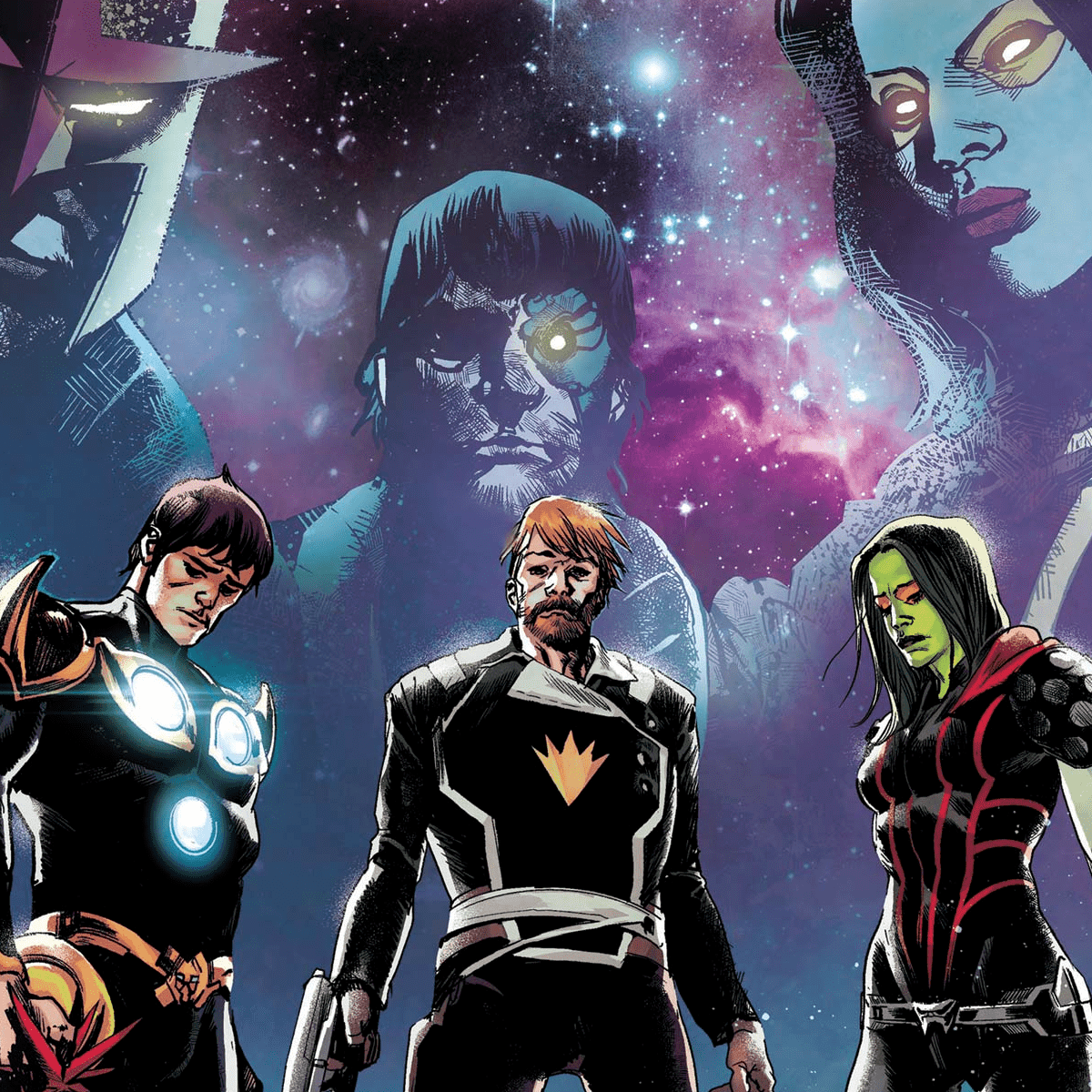Guardians of the Galaxy Vol. 2: Here We Make Our Stand is about loss. It’s about how we lose people, how we deal with losing people, and how to come back from loss. It’s about how you can keep on going — to live rather than simply be alive, in a world where you’re the only one left. It’s about loss on a societal level, on a familial level, on an individual level – it’s a book about people having a really bad day, and then keeping on going.
Phyla-Vell loses her wife, she thinks. Gamora and Nova lose their love and closest friend. Hercules loses his family, and his civilization. Star-Lord loses his friends and love, finds a new one, and then loses it all again. The Kree and the Skrulls lose their whole raison d’etre, the eternal war between the two. Rocket loses much of Groot, again. The Snarks lose their minds.
Except for Noh-Varr. Noh-Varr doesn’t really lose anything. He’s actually having a pretty good time, all told. Marvel Boy is pretty great.

The first trade of Al Ewing’s Guardians of the Galaxy was basically scene-setting. It was putting the characters in the right place, setting up the dominos. This trade actually knocks them down. It gives us the emotional payoffs to arcs that started with Gerry Duggan, with Dan Abnett and Andy Lanning, with Donny Cates, with Steve Englehart – and it manages to keep the payoffs to those arcs consistent to the overarching themes of the books.
Take Nova, for instance. Abnett and Lanning set up a character that was basically working himself to the brink, every minute of every day. Going from galactic emergency to galactic emergency, Nova bore the entire power – and the entire responsibility – of an entire galactic police force. Then, when that organization gets set up again, they all die on him. Twice. His parents hate him, his brother is either dead, or the leader of a corps of space fascists, and the New Warriors aren’t returning calls, either.
Ewing asks what that does to someone – he asks how a person can take all of that, day after day after day.
And the answer is they can’t! Nova is having a breakdown. He has some pretty severe depression, and is basically taking the blame for everything that has went wrong in his life since Annihilation. Nova is in therapy throughout the book – he’s getting that help that he needed since he watched almost all his friends die around him. And I don’t mean help by people in capes and tights.
Or, Hercules. Hercules, after his reinvention by Ewing at the end of the (very good!) Avengers: No Road Home has been a man without a home. Zeus and the rest of his family have returned as murderous space kings with their very own evil space home.
Basically, he’s Orion.
But where Kirby’s character was a berserker, Ewing explores how an all-loving character finds his way forward in a world without loved ones. Hercules becomes a character who is comforting and is doing good because it’s good, in spite of his family.
I’m not even going to go into Star-Lord’s arc, which honestly is best experienced, rather than just read about. Just trust me on this one.
These themes are expressed in a wide variety of stories, too. Al Ewing and his collaborators, Marcio Takara, Juann Cabal, and Federico Blee, do a traditional superhero fight, a locked door mystery, a talky therapy issue, and a psychedelic century-long pulpy adventure all in the space of six issues. That he can bounce from genre to genre, story to story, and still maintain a consistent theme and tone is impressive in and of itself.
Look, it’s not perfect. There’s a King in Black tie-in that is totally unnecessary, the book assumes a knowledge of old Marvel Cosmic stories that I don’t think many people will have, and a lot of the Dragon of the Moon stuff is clunky. But, well, this is Al Ewing. Unnecessary event tie-ins and an assumed encyclopedic knowledge of the Marvel continuity comes with the territory. When you buy an Al Ewing book, you can guess what’s inside.
I’m quoted on the back cover as saying that this is one of Al Ewing’s best books, and I stand by that. It has the scale of an Ultimates, the emotional power of an Immortal Hulk, and the artistic punch of an We Only Find Them When They’re Dead. The series is still going, and I’m excited to see what comes next.
Join the AIPT Patreon
Want to take our relationship to the next level? Become a patron today to gain access to exclusive perks, such as:
- ❌ Remove all ads on the website
- 💬 Join our Discord community, where we chat about the latest news and releases from everything we cover on AIPT
- 📗 Access to our monthly book club
- 📦 Get a physical trade paperback shipped to you every month
- 💥 And more!














You must be logged in to post a comment.